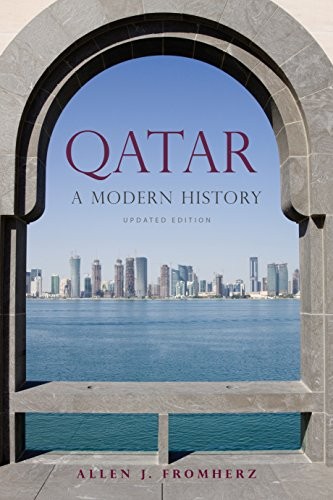Qatar: A Modern History
Other than a short publication from 1979, there are few academic books on the history of Qatar. After spending a year in Qatar, at Qatar University, Allen Fromherz wrote 'Qatar: A Modern History'. The book was originally published in 2012, (Kamrava's book is 2013) however, the updated version (published in 2017) provides updates throughout the text (as additions, this also makes for some jumpy reading at parts). As a history, this book has the potential to remain relevant longer, however only about half of the book is history while the other half is better described as current affairs (a focus on the decade before publication). The book provides a lot of historical information, however at many points it is unclear where the historical information is coming from (not being referenced). Although at times repetitive, this is a useful text and worth reading for anyone interested in contemporary history. A serious limitation, however, is the reliance upon the colonial record and the absence of Arabic (or any other, such as Turkish) sources. This replicates the colonial gaze of history, which the author recognizes but does little to address.
A few notes:
"Qatar is not a place 'without a past' or 'without a culture' as it has been described in popular literature. Ironically, anxiety about a lack of historical roots appears to be felt more by visitors to Qatar than by Qataris themselves. Perhaps expecting exotica, adventure and orientalized Arabness, the expatriate is disappointed by the modernity, by places that look 'Western' or 'just like home'. Many Qataris, in contrast, rarely express the same level of postmodern angst." (p. 4)
"Qatar is one of the world's most unlikely political entities. Surrounded by powerful and expansionist neighbours and projecting into Gulf waters, waters rocked by centuries of conflict, Qatar has one of the more extraordinary stories of state formation in the Gulf." (p. 41)
"No longer did the most respected man in Doha need to base his power ultimately on the Islamic baya, the oath of allegiance and obligation between ruler and ruled, or the shura and majlis, the council of respected sheikhs in Arabic tribal and Islamic religious tradition, that power was now based on the full weight of the British navy. As Lisa Anderson aptly observed, before imperial interests created European-style monarchy in the Middle East, 'Political authority has been exercised and justified not as an aspect of family or property but on religious grounds.'" (p. 57)
"Both external powers were kept at bay by the resourcefulness of the Qataris under Muhammad bin Thani and his successors, especially Shiekh Jassim Al-Thani. Qatar, led by a successful line of tenacious and usually astute Al-Thani Emirs successfully resisted full external domination. They accomplished this not through technological superiority but through the deft use of diplomacy and negotiation. Only at the last resort, as at Wajbah against the Ottomans in 1892, would the Qataris use force to protect their position. The Qataris continually searched for rivals who would be partners." (p. 65)
"The fourth Article virtually hands over all of Qatar's foreign policy to the British government, even forbidding correspondence with 'any other power' without the consent of the 'High British Government'. Nor was Abdullah permitted to 'cede to any other Power or its subjects, land either on lease, sale, transfer, gift, or in any other way whatsoever'. A prohibition on selling land to non-Qataris, originally part of a British strategy to control Qatar's foreign commitments, continues to this day, with the exception of..." (p. 71)

